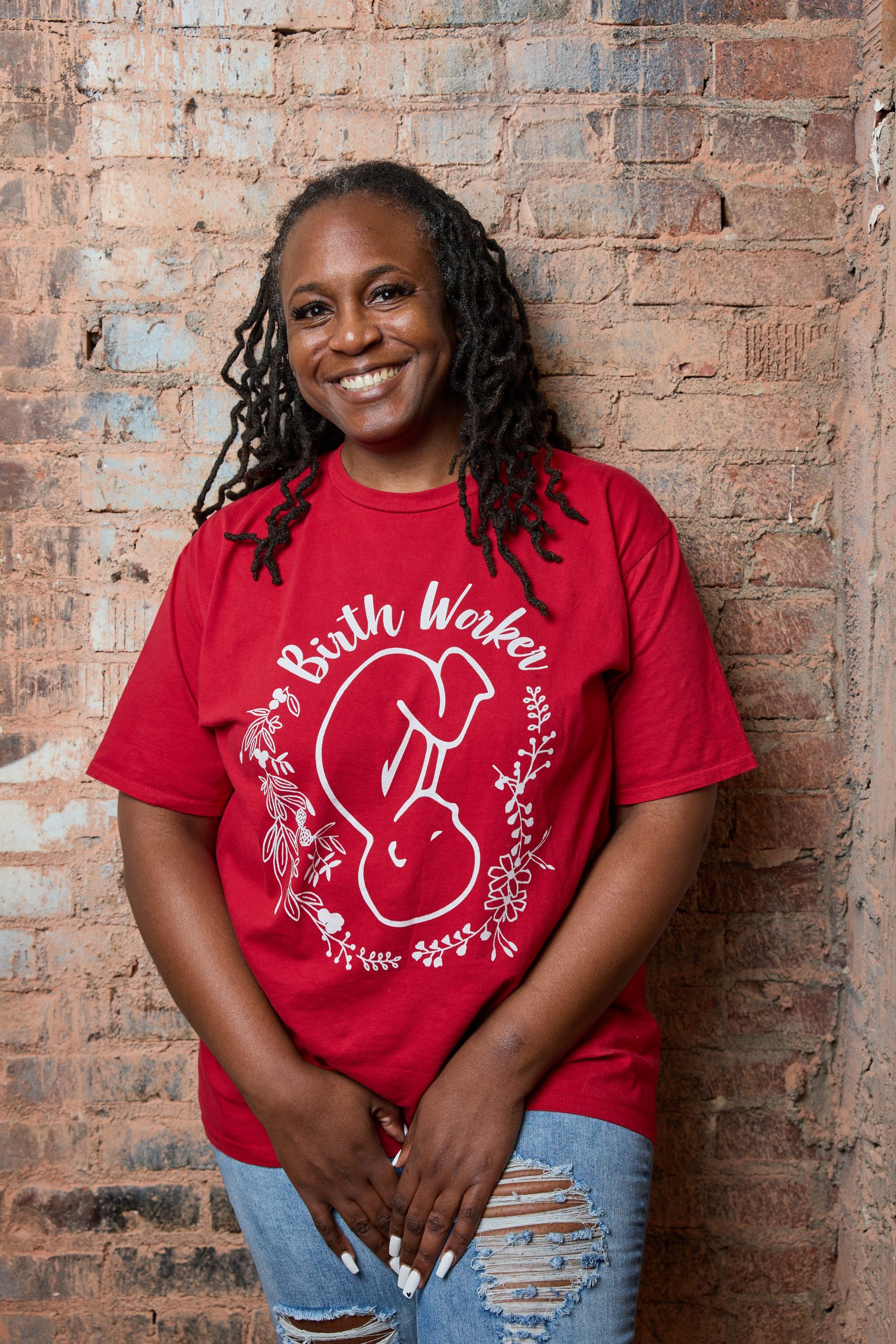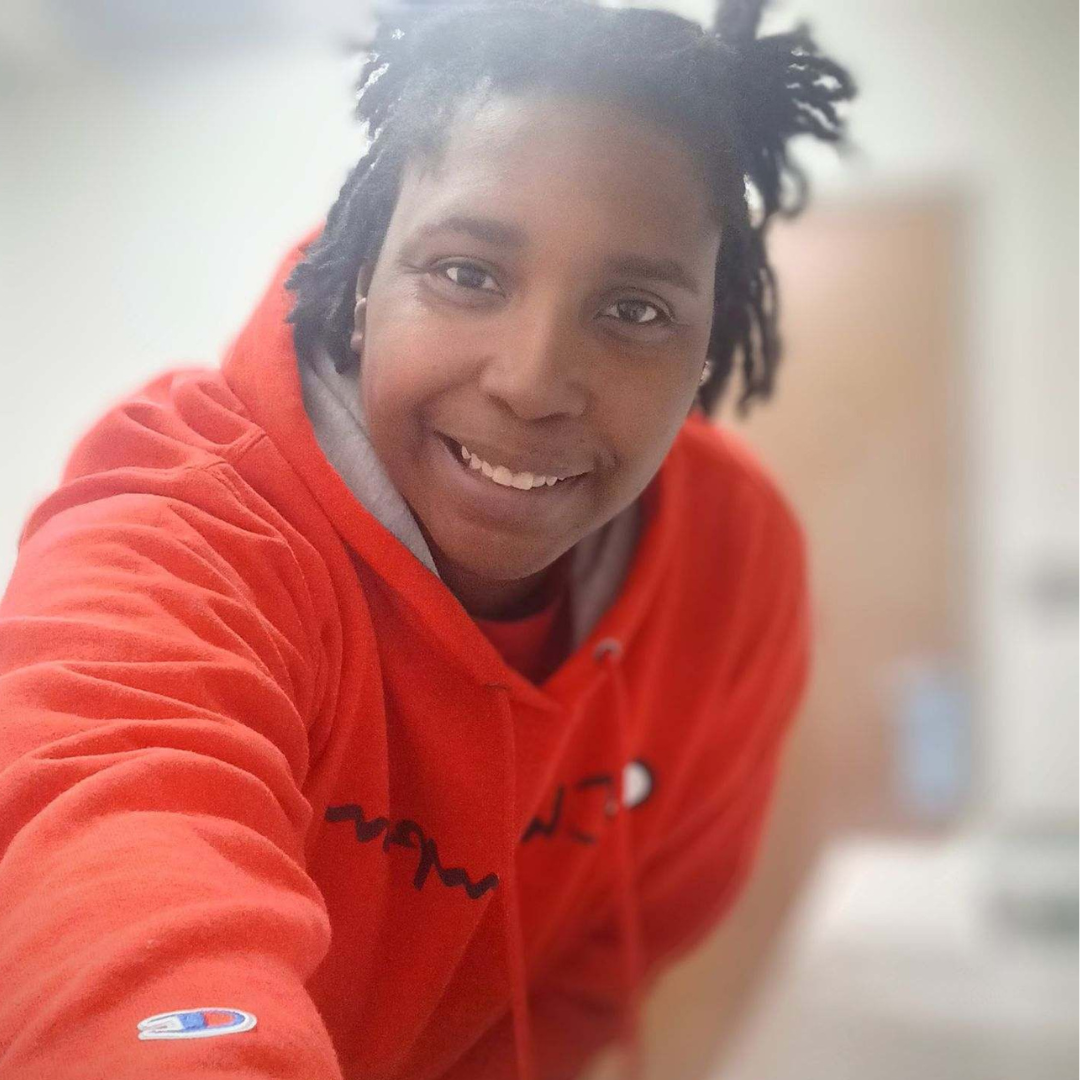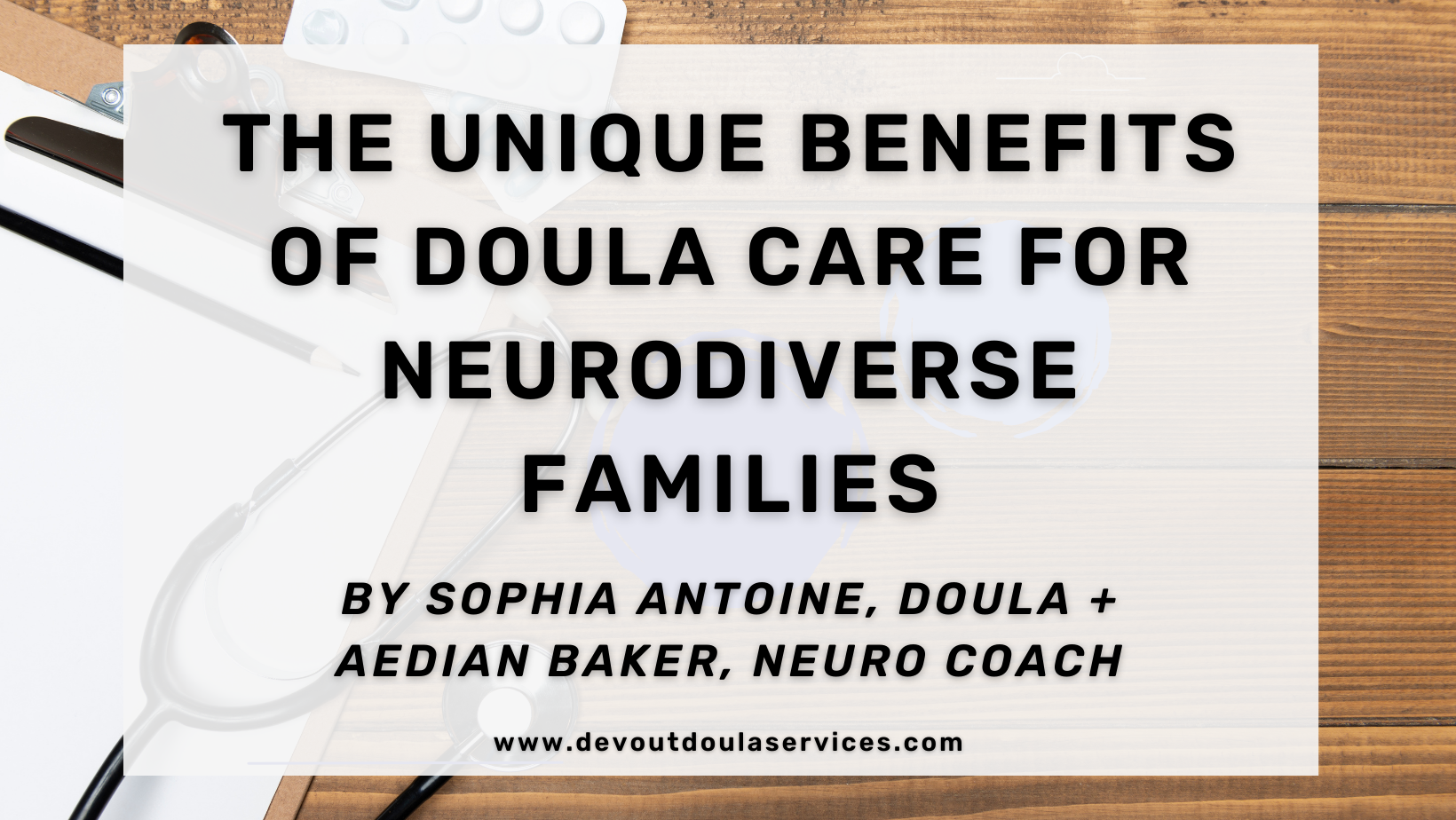The journey to parenthood is as diverse as the individuals embarking on it. Among these experiences, neurodivergent individuals face unique challenges that often go unrecognized in the typical birthing narrative. Neurodiversity, a term that describes a range of neurological differences such as autism, ADHD, and sensory processing disorders, significantly impacts how individuals perceive and interact with the world around them. In the realm of pregnancy and childbirth, these differences can transform what should be a supported and respected process into one that can be filled with misunderstanding and stress.
The importance of personalized support cannot be overstated. For neurodivergent birthing persons, this support is anything but a luxury; it’s a necessity for navigating the complexities of pregnancy and childbirth with dignity and much needed autonomy. Enter the doula: an ally in support and understanding. A doula’s role extends beyond mere companionship; they are educators, advocates, and a consistent presence throughout the process, offering support that addresses the specific needs of neurodivergent individuals.
Today, we will highlight the very vital role that doulas play in supporting neurodivergent birthing persons. By exploring the unique challenges faced by these individuals and the specialized support provided by doulas, we will underscore the necessity of including a doula in every neurodivergent person’s birth plan. Doulas advocate for a birthing process that respects, supports, and celebrates the neurodivergent experience, ensuring that every birthing person feels heard, seen, and valued. As is their right.
Understanding Neurodivergence in Childbirth
Neurodivergence encompasses a spectrum of neurological variations that include autism, ADHD, dyslexia, Tourette Syndrome, and sensory processing disorders, and many others. These differences affect how individuals process information, communicate, and interact with their environment. In the context of pregnancy and childbirth, neurodivergent individuals may face distinct challenges that can significantly impact their birthing experience.
Recognizing these unique needs is crucial for creating a positive birthing experience. The standard protocols and environments in many healthcare settings do not always align with the needs of neurodivergent individuals, leading to experiences that can feel alienating, overwhelming, or even traumatic. This mismatch highlights the critical importance of having support personnel, like doulas, who are specifically attuned to and skilled in navigating these challenges.
As if the changes happening within the body aren’t enough, for neurodivergent individuals, there are challenges that are unseen or misunderstood by those around them. These challenges are the reason why empathetic support and understanding from healthcare providers and partners are needed. Below, we explore some of these challenges in more detail:
Heightened Sensory Experiences: For neurodivergent individuals, the already intense sensory environment of a hospital or birthing center can be overwhelming. The beeping of machines, the fluctuation of lights, and the constant coming and going of medical staff can exacerbate stress and discomfort, potentially complicating the birthing process.
Communication Barriers: Effective communication with healthcare providers is crucial during childbirth. However, neurodivergent individuals may struggle with verbal communication under stress or may interpret language more literally. Misunderstandings can lead to feelings of alienation and anxiety, impacting their ability to advocate for themselves and their babies.
Emotional and Psychological Intensity: Childbirth is an emotionally and psychologically intense experience for anyone. For neurodivergent individuals, these intensities are magnified. The rapid changes in emotions, combined with a high-stress environment, can lead to overwhelm and difficulty coping.
Physical Challenges and Discomfort: Neurodivergent individuals may experience physical sensations more acutely. The pain and discomfort of labor, often intense, can be even more so for someone with heightened sensory processing. Traditional pain relief methods may not be suitable or sufficient, requiring a more personalized approach to pain management.
Overlooked or Misinterpreted Needs: Medical professionals may not always recognize or understand the specific needs of neurodivergent birthing persons. Expressions of discomfort or distress may be misinterpreted, leading to inadequate care during crucial moments.
Now, let’s add the doula— dedicated to ensuring that neurodivergent birthing persons are seen, heard, and supported. Doulas can transform the birthing experience for neurodivergent individuals by providing the understanding needed to navigate these challenges. My dear friend Aedian was kind enough to describe her birth experience to help us understand what it was like for her. In her own words, she shared the impact a doula would have had if one was present at her birth:
“As a neurodivergent individual, I firmly believe I would have greatly benefited from the support of a doula during pregnancy, birth, and especially after birth. Until recently, I was under the impression that I had such support because my wife, who was practicing at that time, was by my side. However, I’ve since realized that while she provided immense care and support, there were certain comforts I needed that I felt uncomfortable discussing with her.
She took excellent care of me throughout the process, but at times, I felt guilty. I worried that I complained too much about aches and pains, considering she also had to care for our other children. Despite birthing a 9-pound baby and enduring constant “lightning crotch” and hot flashes, there were limits to how she could alleviate my discomfort. It would have been invaluable to have someone else take on some of these burdens.
The delivery was particularly difficult. Our concerns were overlooked by the medical team, highlighting the need for an advocate who could remain objective. As the pain from the pitocin intensified, my wife, overwhelmed by my suffering, acquiesced to my desires. Unfortunately, this meant that the strategic support she had provided to others in the past was set aside in her desperation to ease my pain.
I vividly recall the absence of her comfort when they attempted to administer the epidural seven times, eventually excluding her from the room. My back pain became excruciating after hours of pushing without progress, leading to a cesarean section. The relief after my daughter’s birth was profound, yet the subsequent medical emergency, characterized by significant blood loss, was terrifying for both of us.
The postpartum period was marked by trauma. Physical limitations prevented me from bonding with my daughter as I had hoped, and difficulties with breastfeeding contributed to feelings of failure. These feelings were compounded by a reluctance to discuss them, for fear of making my wife feel responsible.
Reflecting on these experiences, the distinction between having a doula and a partner becomes clear. If given another opportunity, I would ensure the presence of a doula to allow my wife to simply be my wife.
It’s imperative for any woman to have the support of a doula. Someone to advocate for the mom while everyone else takes care of the baby. It’s dire that a neurodivergent mom has that support because a lot of the time, we can’t get in touch with how we feel or we feel a lot of emotions very intensely. Sometimes the only way to express those emotions are not acceptable to society. In the middle of bringing new life, every emotion is heightened. We definitely need a team surrounding us that understands what we need and how to get it for us.”
Not to belabor the point, but it is crucial for every birthing person, particularly neurodivergent individuals, to have the support of a doula. Doulas provide advocacy and understanding during a time when emotions are intense and communication may be challenging. This support is not just beneficial—it is essential for navigating the complex emotions and physical challenges of childbirth and the postpartum period.”
The Role of Doulas in Providing Support
A doula’s support extends beyond encouraging words. Depending on when you hire one, a doula becomes a part of your family; your confidant, and your trusted friend. Your doula will be there to answer your questions, laugh with you, and cry with you. You have a teammate that will stand by you throughout the entire process. The nurse comes in and out of the room and leaves when the shift is done. The doctor enters the room when it’s time for the baby to make their entrance. Your doula will never leave your side.
Here are more ways doulas make a difference:
Advocacy
Doulas serve as a voice for neurodivergent birthing persons, especially in situations where they may struggle to communicate their needs or preferences. A doula’s advocacy ensures that the birthing person’s wishes are heard and respected by medical professionals, reducing the likelihood of misunderstandings or feeling dismissed. Aedian’s experience shows the need for an advocate who is not emotionally entangled in the situation, capable of making clear-headed decisions and ensuring that the birthing person’s needs are prioritized.
Customized Support
Understanding and accommodating the unique sensory, emotional, and communication needs of neurodivergent individuals is where doulas excel. They work closely with the birthing person to create a birthing environment that minimizes stressors, such as dimming lights, reducing noise, and facilitating non-verbal communication methods. Doulas also assist in developing personalized pain management strategies that consider sensory sensitivities and preferences, ensuring a more comfortable birthing experience.
Emotional and Psychological Support
The emotional and psychological support provided by doulas is invaluable. Your doula can offer a reassuring presence that helps to mitigate feelings of overwhelm and anxiety. They provide continuous encouragement and comfort, helping neurodivergent birthing persons navigate the intense emotions that accompany childbirth. This support extends beyond the birth itself by fostering a positive postpartum environment conducive to healing and bonding with your new family.
Aedian’s birth story also reveals the impact of having specific care tailored to the neurodivergent experience: “It’s dire that a neurodivergent mom has that support because a lot of the times, we can’t get in touch with how we feel or we feel a lot of emotions very intensely. We definitely need a team surrounding us that understands what we need and how to get it for us.”
Strategies for Doulas Supporting Neurodivergent Clients
These strategies not only facilitate a smoother birthing process but also ensure that the postpartum period is as comfortable and fulfilling as possible. Here are key approaches doulas take to support their neurodivergent clients:
Collaboration with Healthcare Providers
- Effective Communication: Doulas act as intermediaries, ensuring that the communication between healthcare providers and the neurodivergent birthing person is clear, respectful, and takes into account any specific communication preferences or needs.
- Advocacy: They advocate for the birthing person’s wishes and needs, ensuring that medical professionals are aware of and accommodating any sensory sensitivities, communication styles, or specific concerns that might affect the birthing experience.
- Education: Doulas can educate your healthcare providers about neurodivergence, highlighting the importance of tailored approaches to care that respect the neurodivergent individual’s needs.
Creating a Birth Plan
- Personalization: Doulas assist in creating detailed birth plans that reflect the individual’s preferences for communication, sensory input management, and pain relief strategies. This might include preferences for lighting, noise levels, and methods of being touched or comforted.
- Flexibility: They emphasize the importance of flexibility in the birth plan, preparing for various scenarios and ensuring that the birthing person feels in control and supported, regardless of how the birth unfolds.
- Continuity of Care: Ensuring that the birth plan is communicated effectively to all members of the birth team, including any shifts in staff, to maintain a consistent approach to care.
Postpartum Support
- Emotional and Psychological Support: Doulas provide continued emotional support to help navigate the complexities of the postpartum period, particularly as neurodivergent individuals adjust to new routines and experiences.
- Practical Assistance: They offer practical help with newborn care, feeding support, and managing sensory or emotional challenges that may arise, facilitating a smoother transition to parenthood.
- Resource Connection: Doulas connect clients with additional resources, such as support groups, therapists specialized in postpartum care, and services that cater to neurodivergent parents, ensuring a supportive network beyond their direct involvement.
Doulas play a crucial role in supporting neurodivergent birthing persons through pregnancy, childbirth, and the postpartum period. Their expertise can significantly impact the overall experience, making childbirth more accessible, less stressful, and more empowering for their neurodivergent clients.
Conclusion
Aedian illustrates how neurodivergent individuals can face additional hurdles during childbirth and postpartum periods. Her story brings to light the invaluable role of doulas in the birthing space. As we advocate for more inclusive and personalized birthing care, the need for doulas to support neurodivergent birthing persons cannot be overstated. Doulas offer more than just birth support; they provide a bridge between the birthing person and the impersonal medical system. Your doula will ensure that every birthing person’s needs are heard, respected, and honored.
At Devout Doula Services, we are committed to providing compassionate, personalized support for all birthing persons. Click HERE to contact us today to discover how our doula services can empower your birthing experience.
You may also be interested in:

Sophia Antoine
Childbirth Educator | Doula | Speaker
Sophia Antoine is a dedicated and compassionate doula with nearly two decades of experience in supporting families through their pregnancy, labor, and postpartum journeys. A native of Arcadia, FL, Sophia has made it her mission to empower and educate mothers and families on the importance of holistic, culturally sensitive, and evidence-based birth support.
Sophia brings a deep understanding of the unique challenges faced by families in the American healthcare system. She is passionate about advocating for birth justice and reducing health disparities within her community.
Beyond her professional credentials, Sophia brings warmth, empathy, and a reassuring presence to every birthing space. She is well-versed in a variety of comfort measures, including rebozo techniques, acupressure, and aromatherapy, and she tailors her approach to the unique needs and preferences of each family she serves.
When Sophia is not supporting families during their most transformative moments, she enjoys reading, teaching Zumba, working out, and advocating for maternal health policy reform. Sophia is grateful for the opportunity to serve her community as a doula and childbirth educator, and she remains committed to creating safe, nurturing, and empowering birth experiences for all families.

Aedian Baker
Neurodivergent Support Specialist
Hailing from the vibrant landscapes of North Carolina, Aedian Baker stands as a beacon of guidance and support within the neurodivergent community. Coach A passionately navigates the complex and spicy world of neurodiversity through a lens of empathy, understanding, and lived experience.
In her enlightening blog, Coach A explores a myriad of vital topics, each designed to foster connection, advocacy, and self-discovery among neurodivergent individuals and their families. From the delicate art of supporting teens who fiercely guard their independence to championing for services we wish we had had, her writings delve into the heart of what it means to live a neurospicy life.
As a proud member of the LGBTQIA+ community and a BIPOC individual diagnosed with ADHD (AuDHD), Coach A’s voice is one of authenticity and relatability. Her sixteen years of marriage stand as a testament to her commitment to love, understanding, and the journey of continuous learning and adaptation.
Coach Aedian Baker is more than just a life coach; she is a trailblazer for neurodivergent empowerment, a tireless advocate for inclusivity, and a dedicated ally to all who navigate the beautifully complex spectrum of neurodiversity. Join her as she empowers neurodivergent individuals and their families to embrace their unique journey with courage, love, and a sense of belonging.




